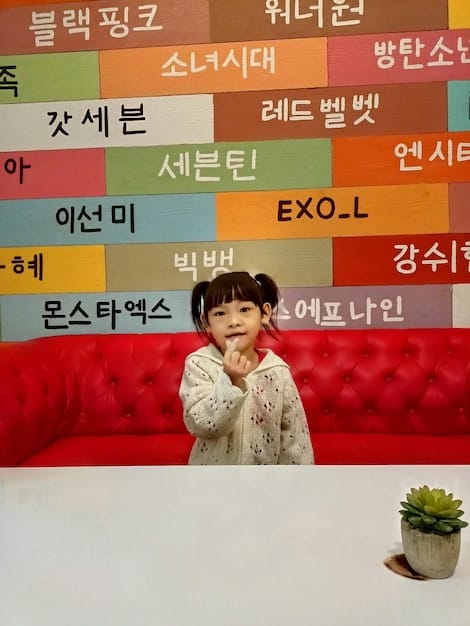Mastering Korean Slang in Dramas: Your 2025 Guide

Advertisements
Mastering Korean slang from dramas in 2025 empowers you to understand nuanced conversations, connect deeply with the culture, and enhance your K-drama viewing experience with trendy expressions and real-life context.
Dive into the vibrant world of Korean dramas and unlock the secrets of everyday conversations by mastering Korean slang from dramas: a guide to understanding common phrases and expressions in 2025. This article will help you navigate the ever-evolving Korean language with confidence, making your viewing experience more immersive and engaging.
Anúncios
Why Learn Korean Slang from Dramas?
Learning a language goes beyond textbooks and formal grammar. To truly understand and communicate effectively, it’s crucial to grasp the informal language used in everyday situations. Korean dramas offer a window into this world, showcasing the latest slang and expressions used by native speakers.
By understanding these slang terms, viewers can gain a deeper appreciation for the nuances of Korean culture and improve their comprehension skills. Recognizing the popular phrases, you’ll enhance your viewing experience and bridge the gap between textbook learning and real-life conversations.
Anúncios

Essential Korean Slang Terms You’ll Hear in Dramas
Korean dramas are filled with unique slang terms that add color and authenticity to the dialogue. Familiarizing yourself with these expressions can greatly enhance your understanding of Korean culture and the language itself. Let’s explore some of the most common and useful slang words you’ll likely encounter in your favorite dramas.
Common Greetings and Farewells
Beyond the standard greetings like “Annyeonghaseyo,” Korean speakers often use informal alternatives in casual settings. These slang greetings and farewells add a personal touch to conversations.
- 안녕 (Annyeong): A casual and friendly way to say “Hi” or “Bye” to someone you’re close to.
- 잘 가 (Jal ga): Meaning “Go well,” it’s a common farewell used when you’re staying and the other person is leaving.
- 잘 있어 (Jal isseo): Used when you’re leaving and the other person is staying, meaning “Stay well.”
These greetings and farewells are quick, easy to remember, and will make you sound more natural speaking Korean.
Expressions of Agreement and Disagreement
Korean slang also includes several ways to express agreement or disagreement in an informal manner. These expressions contribute to the tone and dynamic of conversations.
- 응 (Eung): Simply means “Yeah” or “Okay” in a casual setting between friends.
- 아니 (Ani): The informal way to say “No.”
- 헐 (Heol): Roughly translates to “What the…” or “OMG,” used to express disbelief or surprise.
These expressions are frequently used in dramas and are valuable for casual conversations.
Slang for Describing People and Situations

Describing personalities and situations using slang is a fun way to add depth to your understanding of Korean. These terms often reflect cultural viewpoints and sensibilities.
Whether you want to describe a friend, a love interest, or a comedic scene, knowing this slang will give you more expression options.
Personality-Related Slang
These slang terms offer insight into how Koreans perceive personality traits and social behaviors.
- 모태솔로 (Motae Solo): Refers to someone who has never been in a relationship since birth.
- 츤데레 (Tsure-dere): Describes someone who is initially cold or harsh but eventually shows a warmer, kinder side.
- 뇌섹남/뇌섹녀 (Noisegnam/Noisegnyeo): These terms describe men and women who are smart and sexy, possessing both intelligence and charm.
Common Slang Phrases
Beyond individual slang words, phrases also play a significant role in everyday Korean. These phrases often encapsulate specific emotions or reactions.
- 멘붕 (Menbung): Short for “mental breakdown,” used when you’re overwhelmed or stressed.
- 꿀잼 (Gguljaem): Describes something that is extremely fun or enjoyable, like a “honey jam.”
- 핵노잼 (Haegnojaem): The opposite feeling, referring to something incredibly boring or not fun.
Learning these expressions allows you to convey your exact feelings and reactions in various social contexts.
How Korean Dramas Reflect Generational Slang
Korean dramas provide a dynamic platform for showcasing the evolution of slang across generations. Watching dramas from different eras can give you an insight into how language changes over time.
Older dramas might feature slang that is no longer in common use, while newer dramas tend to incorporate the latest trendy expressions. Understanding these changes helps you appreciate the richness and adaptability of the Korean language.
Slang Variations Across Age Groups
Different age groups often have their own unique slang, which can sometimes lead to misunderstandings between generations.
- Older generations may use more traditional expressions, while younger Koreans frequently adopt newly coined terms from online communities or social media.
- Dramas often highlight these differences to add humor or emphasize generational gaps between characters.
Popularity of Slang in Different Drama Genres
The genre of a drama can also influence the type of slang being used. Romantic comedies and youth dramas tend to feature more lighthearted and trendy expressions, while historical dramas might incorporate older, more formal language.
- Understanding the genre-specific slang can prepare you for the type of language you’re likely to encounter.
- For example, a high school drama might be full of teenage slang terms, while a legal drama might use more technical or formal vocabulary.
Tips for Spotting and Learning New Slang
Becoming adept at spotting and understanding new Korean slang requires active engagement and consistent practice. Here are a few tips to help you enhance your learning process:
These practical tips are aimed at improving your abilities to notice and retain new slang expressions in context, to better grasp their nuances and usages.
Active Listening and Note-Taking
Pay close attention to the conversations in Korean dramas. Pause and rewind when you hear unfamiliar slang, try to understand the context, and note down the new words or phrases. Review your notes regularly to reinforce your memory.
- Listening actively helps you grasp the usage and pronunciation of slang in real-life scenarios.
- Taking notes allows you to build a personal database of slang terms for future reference.
Online Communities and Language Exchange Partners
Engage with online communities, forums, and social media groups dedicated to Korean language learning or K-drama discussions. Participate in conversations, ask questions, and seek clarification on slang terms that you find challenging. Consider finding a language exchange partner who is a native Korean speaker. Practicing speaking with them can significantly improve your understanding and usage of Korean slang.
- Online communities provide a platform to learn from others and stay updated on emerging slang trends.
- Language exchange partners offer personalized feedback and practical insights into using slang in various contexts.
How to Appropriately Use Slang in Conversations
Using slang correctly requires understanding the social context and level of formality. While slang can add color and authenticity to your conversations, it’s essential to use it appropriately to avoid misunderstandings or causing offense.
It is necessary to be mindful of who you are speaking to when using slang and the environment where you are speaking.
Considering Your Audience
Be mindful of the age, social status, and relationship you have with the person you are talking to. Slang that is appropriate among close friends may not be suitable when speaking to someone older or in a professional setting.
- Avoid using slang with strangers or people you’ve just met, as it may come across as disrespectful.
- Adjust your language to the situation and audience to maintain appropriate communication.
Understanding Context and Formality
Most slang terms are suitable for informal, casual settings. Always avoid slang terms in formal meetings, presentations, or official documents, as they will be out of place, and switch to standard, polite language. Remember, not every word or expression heard in a drama will have its place outside of it.
- Recognize the degree of formality required in different situations and adapt your language accordingly.
- Pay attention to how native speakers use slang in different contexts to gauge the appropriate usage.
| Key Point | Brief Description |
|---|---|
| 🎭 Drama as a Learning Tool | Use K-dramas to immerse yourself in authentic Korean slang and expressions. |
| 🗣️ Slang Spotting | Actively note new slang encountered in dramas for later review and practice. |
| 🤝 Context Matters | Understand the context of slang to appropriately use it, and being mindful of the age of the person one is speaking to. |
| 🌐 Community Learning | Engage with online Korean learning communities for slang clarifications. |
Frequently Asked Questions
▼
Learning Korean slang allows you to better understand nuanced conversations, connect with the culture, and enhance your overall experience of communicating with native Korean speakers, especially when watching content such as dramas.
▼
Korean dramas are a primary source of Korean slang and a means of keeping up to date with new terms. Online communities, social media, and conversations with native speakers also provide valuable examples.
▼
Active listening, note-taking, engaging with online communities, and practicing with language exchange partners are all effective strategies. Watching the content can provide some level of context of the slang.
▼
It’s important to consider your audience and the setting. Save slang for casual settings among close friends, and avoid using it in formal situations or with people you don’t know well.
▼
Yes, slang can vary significantly among different generations. Older generations may not be as familiar with newer slang terms used by younger Koreans, and vice versa, so always being up to date can be a help.
Conclusion
By investing time in learning Korean slang from dramas, language learners unlock a deeper connection and understanding of Korean culture. This exploration not only enriches the viewing experience but also enhances communication skills, fostering a more authentic and immersive understanding of the Korean language.





